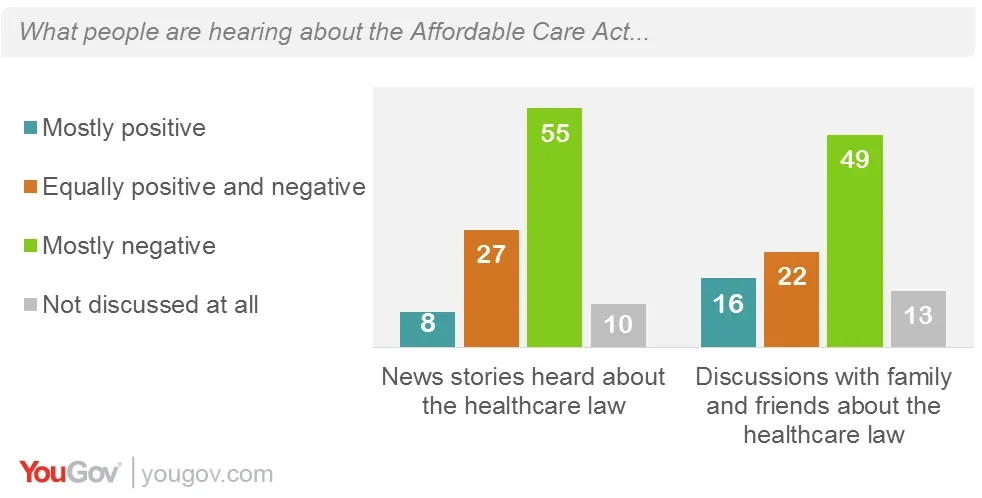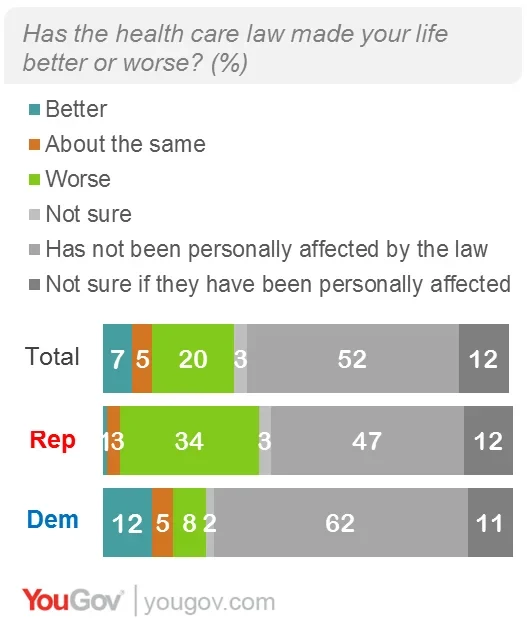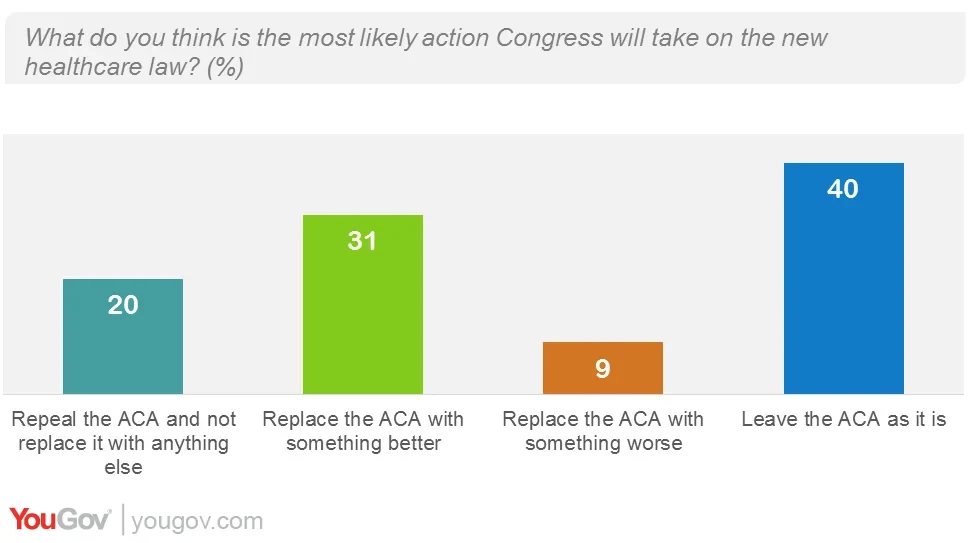Americans tend to oppose the Affordable Care Act, but most people say that the law has not had an impact on them
While many Americans (43% in the most recent Economist/YouGov Poll) say they want the Affordable Care Act repealed, most Americans aren’t exactly sure how the law affects them personally. And they admit to hearing a drumbeat of negative news about Obamacare from both the news media and their friends and relatives.
Most Americans are hearing mostly negative information about the ACA. Only 8% say they have heard mostly positive news about the law from the media. Discussions about the new law with friends and family have been only marginally more positive.

Democrats are one and a half times as likely to have had discussions that focus on the positive than to have talked about the negative aspects of the law. Republicans have held very different conversations: 77% of them say their discussions with friends and family about Obamacare have been mostly negative. Assessment of news coverage about the law is uniformly negative by partisans on both sides.
Of course, much news coverage in the last six months has been about the problems at healthcare.gov. Although many people have used the site successfully in recent months, perceptions of it are still not positive. Some of that is because there are people who tried to use the site in October and November, before it was fixed, and never went back. Just as many people last used healthcare.gov in October and November, when the site had serious problems, as have gone to it in the last six weeks when enrollments soared.
In the last few weeks, about a third of users have expressed a positive opinion. However, half remain negative. And only one in four Americans overall call the health care law a success.

When Americans are asked about their own experiences with the law, most admit it hasn’t impacted them – or that they aren’t sure if there has been an impact yet. But those who say they have been affected are negative.
How Americans assess the law’s impact on them has a partisan tinge. More Republicans (41%) than Democrats (27%) claim the law has affected them. And nearly all Republicans who report an impact say it has been negative. Democrats are more likely to say the impact was positive. By more than four to one, liberals claim to have been affected positively, while by eighteen to one, conservatives say the law has made their lives worse.
Younger adults are slightly more likely to say they are doing better than worse under the ACA, while those 65 and older overwhelmingly say things are worse.
When people are asked to explain how they have been personally affected, it is sometimes hard to sort out what has changed because of the ACA, what is the result of normal insurance company or employer decisions, and what is just a person’s general feelings about the law. Some report increases in premiums and co-pays which may or may not be directly tied to the law, other talk about increases in taxes. Older adults who said they were affected complained about Medicare changes.
There were a number of more specific ACA complaints. Several mentioned employers moving people to Obamacare because of costs. Some said employers wouldn’t hire people because of the health care coverage requirement. Others noted the differences in their old plans and their new ones in coverage, deductibles and costs. Some objected to being required to buy insurance. A few noted that their old doctors were no longer available.
Those who said their lives had been made better by the ACA paint a completely different picture. A number point out that they now have insurance coverage – and can afford it. Several young adults mentioned being able to stay on parents’ plans; others noted they didn’t have to worry about pre-existing conditions.
The Republican-controlled House has taken nearly 50 votes to repeal Obamacare since it passed in 2010. While a majority of Americans expect the ACA will be repealed, there is no consensus on what will follow. Less than a third say it will be replaced with something better. More, 40%, don’t expect anything to change.

While Democrats and Republicans differ dramatically on what they want to happen (77% of Republicans want the law repealed; half of Democrats want it expanded), their expectations are fairly similar. Just about a third of both Republicans and Democrats think the law will be repealed and replaced with something better.
Image: Getty
Full results can be found here.
Economist/YouGov poll archives can be found here.








